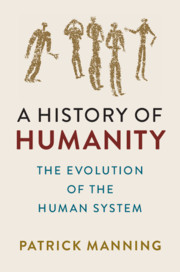Book contents
- A History of Humanity
- A History of Humanity
- Copyright page
- Contents
- Maps, Figures, and Tables
- Preface
- Acknowledgments
- Introduction
- Pleistocene Evolution
- 2 Biological and Cultural Evolution
- 3 Speech and Social Evolution
- 4 Systemic Expansion
- 5 Production and Confederation
- Holocene Evolution
- Anthropocene Evolution
- Appendix: Frameworks for Analysis
- Notes
- Glossary
- References
- Index
4 - Systemic Expansion
from Pleistocene Evolution
Published online by Cambridge University Press: 14 February 2020
- A History of Humanity
- A History of Humanity
- Copyright page
- Contents
- Maps, Figures, and Tables
- Preface
- Acknowledgments
- Introduction
- Pleistocene Evolution
- 2 Biological and Cultural Evolution
- 3 Speech and Social Evolution
- 4 Systemic Expansion
- 5 Production and Confederation
- Holocene Evolution
- Anthropocene Evolution
- Appendix: Frameworks for Analysis
- Notes
- Glossary
- References
- Index
Summary
Expansion of the Human System began with divergence and migration of speaking communities in their homeland. Then, up to 45,000 years ago, migrants moved southwest across Africa and eastward along the Indian Ocean littoral, as documented through archaeology, genomics, and climate. Language evidence, supplemented by an accompanying website, confirms the value of Joseph H. Greenberg’s tradition of large-scale linguistic analysis. African migration included multiple settlements among preexisting hominin populations. The parallel migration into Asia, now identified genetically as a single migration, relied on watercraft at most stages. Surviving language groups indicate the path of migrants along the Indian Ocean littoral. Only after 45,000 years ago were migrants able to move northward, into the ecologically distinctive temperate zone. Once in the steppes, migrants moved east to Northeast Asia and west to the Black Sea. As networks facilitated exchange of dogs, religious ideas, bows and arrows, the Human System thus expanded from its initial locality to become a hemispheric network of communities in contact.
- Type
- Chapter
- Information
- A History of HumanityThe Evolution of the Human System, pp. 62 - 83Publisher: Cambridge University PressPrint publication year: 2020



